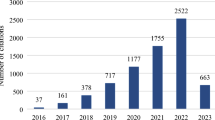Abstract
Scientific communities are motivated to schedule the data-intensive scientific workflows in multi-cloud environments, where considerable diverse resources are provided by multiple clouds and resource limitation imposed by individual clouds is overcome. However, this scheduling involves two conflicting objectives: minimizing cost and makespan. In general, dealing with such conflicting criteria is a difficult task. But fortunately recent efficient methods for solving multi-objective optimization problems motivated us to provide a multi-objective model considering minimization of cost and makespan as objectives. For solving this model, we use different scalarization procedures such as weighted-sum, Benson's scalarization and weighted min–max under different scenarios. Moreover, we investigate the stability of obtained solutions and propose a new approach for determining the most stable solution related to weighted-sum and weighted min–max as post-optimality analysis. Results indicate that our proposed weighted-sum approach outperforms the previously developed methods in terms of hypervolume.




Similar content being viewed by others
Notes
The Epigenome workflow with 4000 tasks has eight levels. Assume the execution time of each task is in seconds on VM with 1 CCU. The level 5 has 495 tasks with execution time = 9635.01 s. For executing the tasks in level 5 on VMs of Azure with performance 9 CCU, the 56 VMs are needed in which these tasks are executed in three bags with six tasks and 53 bags with nine tasks.
CloudHarmony Compute Unit.
ILOG CPLEX. http://www.ilog.com/products/cplex.
References
Abdi S, PourKarimi L, Ahmadi M, Zargari F (2018) Cost minimization for bag-of-tasks workflows in a federation of clouds. J Supercomput 74(6):2801–2822
Abdi S, PourKarimi L, Ahmadi M, Zargari F (2017) Cost minimization for deadline-constrained bag-of-tasks applications in federated hybrid clouds. Future Gener Comput Syst 71:113–128
Nesmachnow S, Iturriaga S, Dorronsoro B (2015) Efficient heuristics for profit optimization of virtual cloud brokers. IEEE Comput Intell Mag 10(1):33–43
Toosi AN, Calheiros RN, Buyya R (2014) Interconnected cloud computing environments: challenges, taxonomy, and survey. ACM Comput Surv (CSUR) 47(1):7
Wu F, Wu Q, Tan Y (2015) Workflow scheduling in cloud: a survey. J Supercomput 71(9):3373–3418
Schrijver A (1998) Theory of linear and integer programming. Wiley, Hoboken
Kadioglu S, Malitsky Y, Sellmann M, Tierney K (2010) ISAC-instance-specific algorithm configuration. In: ECAI, vol 215, pp 751–756
Fard HM, Prodan R, Fahringer T (2014) Multi-objective list scheduling of workflow applications in distributed computing infrastructures. J Parallel Distrib Comput 74(3):2152–2165
Hu H, Li Z, Hu H, Chen J, Ge J, Li C, Chang V (2018) Multi-objective scheduling for scientific workflow in multicloud environment. J Netw Comput Appl 114:108–122
Zhu Z, Zhang G, Li M, Liu X (2016) Evolutionary multi-objective workflow scheduling in cloud. IEEE Trans Parallel Distrib Syst 27(5):1344–1357
Jena RK (2015) Multi objective task scheduling in cloud environment using nested PSO framework. Proc Comput Sci 57:1219–1227
Wang X, Yeo CS, Buyya R, Su J (2011) Optimizing the makespan and reliability for workflow applications with reputation and a look-ahead genetic algorithm. Future Gener Comput Syst 27(8):1124–1134
Choudhary A, Gupta I, Singh V, Jana PK (2018) A GSA based hybrid algorithm for bi-objective workflow scheduling in cloud computing. Future Gener Comput Syst 83:14–26
Durillo JJ, Prodan R (2014) Multi-objective workflow scheduling in Amazon EC2. Cluster Comput 17(2):169–189
Xu H, Yang B, Qi W, Ahene E (2016) A multi-objective optimization approach to workflow scheduling in clouds considering fault recovery. KSII Trans Internet Inf Syst (TIIS) 10(3):976–995
Qu X, Xiao P, Huang L (2018) Improving the energy efficiency and performance of data-intensive workflows in virtualized clouds. J Supercomput 74(7):2935–2955
Rezaeian A, Naghibzadeh M, Epema DHJ (2019) Fair multiple-workflow scheduling with different quality-of-service goals. J Supercomput 75(2):746–769
Poola D, Ramamohanarao K, Buyya R (2014) Fault-tolerant workflow scheduling using spot instances on clouds. Proc Comput Sci 29:523–533
de Oliveira D, Ocaña KACS, Baião F, Mattoso M (2012) A provenance-based adaptive scheduling heuristic for parallel scientific workflows in clouds. J Grid Comput 10(3):521–552
Fard H, Prodan R, Barrionuevo JJD, Fahringer T (2012) A multi-objective approach for workflow scheduling in heterogeneous environments. https://doi.org/10.1109/CCGrid.2012.114.
Pietri I, Malawski M, Juve G, Deelman E, Nabrzyski J, Sakellariou R (2013) Energy-constrained provisioning for scientific workflow ensembles. In: Third International Conference on Cloud and Green Computing (CGC), 2013. IEEE, pp 34–41
Zeng L, Veeravalli B, Li X (2015) SABA: a security-aware and budget-aware workflow scheduling strategy in clouds. J Parallel Distrib Comput 75:141–151
Mohammadi S, Pedram H, PourKarimi L (2018) Integer linear programming-based cost optimization for scheduling scientific workflows in multi-cloud environments. J Supercomput 74(9):4717–4745
Rehman A, Hussain SS, ur Rehman Z, Zia S, Shamshirband S (2018) Multi-objective approach of energy efficient workflow scheduling in cloud environments. Concurr Comput Pract Exp 31(8):e4949
Arabnejad V, Bubendorfer K, Ng B (2019) Budget and deadline aware e-science workflow scheduling in clouds. IEEE Trans. Parallel Distrib. Syst. 30(1):29–44
Bharathi S, Chervenak A, Deelman E, Mehta G, Su M-H, Vahi K (2008) Characterization of scientific workflows. In: Third Workshop on workflows in support of large-scale science, 2008. WORKS 2008. IEEE, pp 1–10
Ehrgott M (2005) Multicriteria optimization, vol 491. Springer, Berlin
Benson HP (1978) Existence of efficient solutions for vector maximization problems. J Optim Theory Appl 26(4):569–580
IBMI (2009) CPLEX, V12. 1: user’s manual for CPLEX. International Business Machines Corporation 46(53):157
Topcuoglu H, Hariri S, Wu M-Y (2002) Performance-effective and low-complexity task scheduling for heterogeneous computing. IEEE Trans Parallel Distrib Syst 13(3):260–274
Zitzler E, Thiele L, Laumanns M, Fonseca CM, Da Fonseca VG (2003) Performance assessment of multiobjective optimizers: an analysis and review. IEEE Trans Evol Comput 7(2):117–132
Bradstreet L (2011) The hypervolume indicator for multi-objective optimisation: calculation and use. University of Western Australia
Sitarz S (2012) Mean value and volume-based sensitivity analysis for Olympic rankings. Eur J Oper Res 216(1):232–238
Author information
Authors and Affiliations
Corresponding author
Additional information
Publisher's Note
Springer Nature remains neutral with regard to jurisdictional claims in published maps and institutional affiliations.
Rights and permissions
About this article
Cite this article
Mohammadi, S., PourKarimi, L. & Pedram, H. Integer linear programming-based multi-objective scheduling for scientific workflows in multi-cloud environments. J Supercomput 75, 6683–6709 (2019). https://doi.org/10.1007/s11227-019-02877-8
Published:
Issue Date:
DOI: https://doi.org/10.1007/s11227-019-02877-8




